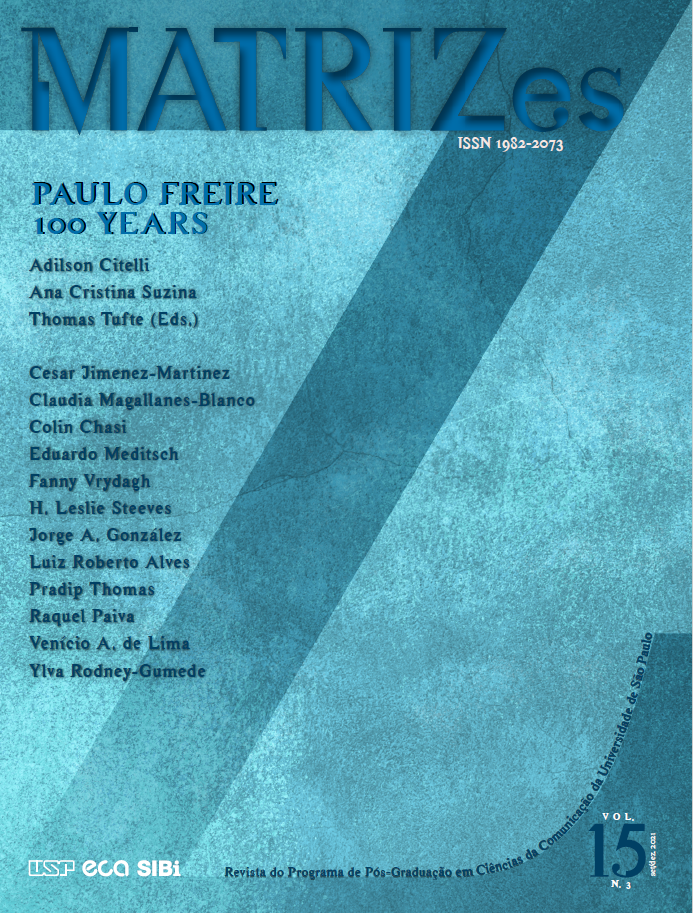Freire’s vision of development and social change: past experiences, present challenges, and perspectives for the future
DOI:
https://doi.org/10.11606/issn.1982-8160.v15i3p185-201Keywords:
Development, Social change, Communication, Paulo Freire, Epistemologies of the SouthAbstract
This article proposes to view Freire’s thinking as a model or even paradigm of communication, development, and social change. To build this as an original argument, we firstly outline Freire’s ontological call, presenting and discussing his underlying five principles. Secondly, we trace Freire’s legacy by presenting and discussing how Freire inspired three significant Ibero-American thinkers, Augusto Boal, Juan Díaz Bordenave, and Boaventura de Sousa Santos. Finally, we deepen our analysis of Freire’s vision of communication, development, and social change, unpacking how he navigates between a normative vision grounded in a utopian aspiration for change, and a very systematic and rigorous methodology, his liberating pedagogy.
Downloads
References
Arnstein, S. R. (1969). A ladder of citizen participation. Journal of the American Institute of Planners, 35(4), 216-224. https://doi.org/10.1080/01944366908977225
Boal, A. (1979). The theatre of the oppressed. Pluto.
Bordenave, J. D. (1989). La sociedad participativa. Chasquí: Revista Latinoamericana de Comunicación, (32), 18-24.
Carpentier, N. (2011). Media and participation. A site of ideological-democratic dispute. Intellect.
Carpentier, N. (2012). The concept of participation. If they have access and interact, do they really participate? Fronteiras – Estudos Midiáticos, 14(2), 164-177. https://doi.org/10.4013/fem.2012.142.10
Freire, A. M. A. (2004). Prologue. In P. Feire, Pedagogy of indignation (pp. xxvii-xxxii). Paradigm.
Freire, P. (1973). Extension o comunicacion? La concientizacion en el medio rural. Siglo Veintinuno.
Freire, P. (1998). Pedagogy of freedom. Ethics, democracy, and civic courage. Roman and Littlefield.
Freire, P. (2004). Pedagogy of indignation [Pedagogia da indignação]. Paradigm.
Freire, P. (2009). Pedagogy of hope [Pedagogia da esperança]. Continuum. (Trabalho original publicado em 1992)
Freire, P. (2017). Pedagogia do oprimido (63a ed.). Paz e Terra. (Trabalho original publicado em 1968)
Galeano, E. (2012, 30 de agosto). Para que sirve la utopía? [Entrevista em vídeo]. YouTube. https://bit.ly/37tdFZr
Gumucio-Dagron, A., & Tufte, T. (Eds.). (2006). Communication for social change anthology: Historical and contemporary readings. Communication for Social Change Consortium.
Levy, H. (2020). Grammars of contestation and pluralism: Paulo Freire’s action in Brazil’s periphery and the rise of right-wing discourse on YouTube. International Communication Gazette, 82(5), 474-489. https://doi.org/10.1177/1748048520943696
Obregon, R., & Tufte, T. (2014). Rethinking entertainment-education for development and social change. In: K. Wilkins, T. Tufte & R. Obregon (Eds.), The handbook of development communication and social change (pp. 168-188). Wiley-Blackwell.
Orué Pozzo, A. (2014). Juan Díaz Bordenave, una comunicación para la vida. Revista Internacional de Comunicación y Desarrollo, 1(0), 51-57.
Paiva, R. (2020). Communities of affect: A Freirean utopia? International Communication Gazette, 82(5), 490-503. https://doi.org/10.1177/1748048520943697
Peruzzo, C. M. (2020). Paulo Freire’s role and influence on the praxis of popular communication in Brazil. International Communication Gazette, 82(5), 425-439. https://doi.org/10.1177/1748048520943693
Sousa Santos, B. (2014). Epistemologies of the South: Justice against epistemicide. Paradigm.
Sousa Santos, B. (2018). The end of the cognitive empire. Duke University Press.
Suzina, A. C. (2016). Digital resources in popular media practices in Brazil: Strategies to reduce asymmetries in the public debate. Observatorio (OBS*), (Número especial: Internet and Social Movements in the context of asymmetries), 11-34. https://doi.org/10.15847/obsOBS0020161081
Suzina, A. C. (2018). Popular media and political asymmetries in the Brazilian democracy in times of digital disruption [Tese de doutorado não publicada]. Universite Catholique de Louvain.
Suzina, A. C. (2020). Discursos dissonantes: Problematizando um modelo de comunicação libertadora através dos conceitos de coexistencia e justiça cognitiva. In N. Prata & S. C. Pessoa (Orgs.), Fluxos comunicacionais e crise da democracia (pp. 88-101). Intercom. https://bit.ly/3zQh94u
Tufte, T (2013). Homenagem a Juan Díaz Bordenave. ComSertões. Revista de Comunicação e Cultura no Semiárido, 1(1), 5-17. https://doi.org/10.36943/comsertoes.v1i1.682
Tufte, T. (2015). Comunicación para el cambio social. La participación y el empoderamiento como base para el desarrollo mundial. Icaria.
Tufte, T. (2017). Communication for social change: A citizen perspective. Polity.
Vrydagh, F., & Jiménez-Martínez, C. (2020). Talking to the right-wing: Pernicious polarization in Brazil and the philosophy of Paulo Freire. The International Communication Gazette, 82(5), 456-473. https://doi.org/10.1177/1748048520943695
Waisbord, S. (2020). Why Paulo Freire is a threat for right-wing populism: Lessons for communincation of hope. The International Communication Gazette, 82(5), 440-455. https://doi.org/10.1177/1748048520943694
Downloads
Published
Issue
Section
License

This work is licensed under a Creative Commons Attribution-NonCommercial-ShareAlike 4.0 International License.
Authors who publish in this journal agree to the following terms:
- Authors retain the copyright and grant the journal the right to first publication, with the work simultaneously licensed under the Creative Commons Attribution License (CC BY-NC-SA 4.0) which allows sharing of the work with acknowledgment of authorship and initial publication in this journal for non-commercial purposes.
- Authors are authorized to assume additional contracts separately, for non-exclusive distribution of the version of the work published in this journal (eg, publishing in institutional repository or as a book chapter), with acknowledgment of authorship and initial publication in this journal.






















